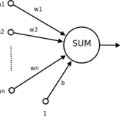Throughout history, the development of artificial intelligence, particularly artificial neural networks, has been open to and constantly inspired by the increasingly deepened understanding of the brain, such as the inspiration of neocognitron, which is the pioneering work of convolutional neural networks. Per the motives of the emerging field: NeuroAI, a great amount of neuroscience knowledge can help catalyze the next generation of AI by endowing a network with more powerful capabilities. As we know, the human brain has numerous morphologically and functionally different neurons, while artificial neural networks are almost exclusively built on a single neuron type. In the human brain, neuronal diversity is an enabling factor for all kinds of biological intelligent behaviors. Since an artificial network is a miniature of the human brain, introducing neuronal diversity should be valuable in terms of addressing those essential problems of artificial networks such as efficiency, interpretability, and memory. In this Primer, we first discuss the preliminaries of biological neuronal diversity and the characteristics of information transmission and processing in a biological neuron. Then, we review studies of designing new neurons for artificial networks. Next, we discuss what gains can neuronal diversity bring into artificial networks and exemplary applications in several important fields. Lastly, we discuss the challenges and future directions of neuronal diversity to explore the potential of NeuroAI.
翻译:在整个历史中,人工智能的发展,特别是人工神经网络的发展,对大脑日益加深的理解,如新神经网络的灵感,如新科尼特的灵感,是进化神经网络的开创性工作。根据新兴领域的动机:NeuroAI,大量的神经科学知识可以通过赋予一个更强大的网络来推动下一代人工智能。我们知道,人类大脑有许多形态和功能不同的神经,而人工神经网络几乎完全建立在单一神经型之上。在人类大脑中,神经多样性是各种生物智能行为的一个有利因素。由于人工网络是人类大脑的微型特征,因此,引入神经科学多样性对于解决人工网络的重要问题,例如效率、可判读性和记忆等,是有价值的。在这个启蒙里,我们首先讨论生物神经多样性的预兆,以及生物神经神经系统传输和处理的特征。然后,我们审查设计新的神经网络的研究,对于各种生物智能网络的新型智能行为来说,神经多样性是一个有利因素。下一步,我们讨论人类神经多样性未来应用的标志性领域,我们讨论什么是神经多样性的标志性领域。</s>





